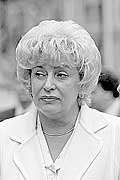Moscow-based politicians pull faces when asked to comment
on St. Petersburg's election style. The most recent campaign has been branded
as no better than the others.
 |
Photo
by Alexander Belenky/SPT
A. Markova |
"I don't know why it is, but every time you have elections in St.
Petersburg, there is always a huge wave of dirty tricks and tactics,"
said Irina Khakamada, co-chairman of the Union of Right Forces, who represents
the northern capital in the Duma. "You have apparently monopolized
the country's market of black PR and underhand campaigning."
But many locals say that the latest campaign offered something new,
and indeed, the perception of the campaign and its winner Valentina Matviyenko
is very different in the two cities.
A number of St. Petersburg politicians and analysts said suppression
of the media - and not dirty tactics - was the most memorable feature
of the election.
"The mass media were paralyzed," said St. Petersburg lawmaker
Mikhail Amosov, himself
an former gubernatorial candidate for the Yabloko party. "In the
past few months I have really been wondering if some kind of censorship
has been introduced on local TV channels. It was tacit consent; they put
all their efforts to promote one candidate and ignored the others."
Political analyst Daniil Kotsubinsky concurred.
"As a voter, I am utterly unhappy with the campaign," he said.
"The average voter was unable to draw an clear picture of what candidates
other than Valentina Matviyenko had to offer. Their abilities to reach
their audiences was limited."
One Moscow-based analyst, Yevgeny Volk, head of the Heritage Foundation,
compared the election to George Orwell's "Animal Farm."
"We clearly have a situation where one candidate is more equal
than the others, while it is presumed that everyone had a fair chance,"
he said.
But Moscow-based Kremlin insider and campaign specialist Gleb Pavlovsky
said Matviyenko was by far the strongest candidate, suggesting her dominating
coverage was based on her merits alone.
Neither did the low turnout not concern him.
"I don't see any catastrophe that nearly three quarters of St.
Petersburgers ignored the elections," Pavlovsky said. "The candidate
did all that was necessary to take the governor's seat."
Khakamada said that for pragmatic reasons her party did not enter the
campaign.
"The governor of St.Petersburg needs the support of the president.
Valentina Matviyenko received it. Supporting her is the most honest way,"
she said.
But where Moscow sees the need for pragmatism, St. Petersburg felt it
was cornered.
Even former governor Vladimir Yakovlev, who publicly supported Matviyenko,
said the pressure from the Kremlin on the locals was enough to make most
people stay home.
"Perhaps the promotion was excessive," he said Monday. "The
people felt everything was decided without them, and there was no need
to go to polling stations."
Yakovlev's deputy Anna Markova, who received nearly 25 percent in the
second-round run-off on Sunday, said the low turnout was clearly a form
of protest from the citizens.
Had the Kremlin been more subtle, the turnout would have been higher,
she said.
"People protest differently: some went to the polling station and
put a mark in "against all candidates" field, while others preferred
to stay away all together," she said Monday.
For Markova, the campaign was memorable for the new strategy applied.
"It had nothing to do with dirty tactics, it was a tremendous,
titanic use of administrative resource," she said. "The entire
government was working against me."
Markova said it was a mistake to think the campaign started when Matviyenko
was appointed presidential representative of the Northwest Region.
"Everything was decided three years ago," she said. "That
appointment was the last step in a three-years construct."
Markova's spokeswoman Alyona Bolgarova offered her own version why Matviyenko
was supported by nearly every political party.
"In the context of the new election law, all parties feel like
guilty schoolchildren afraid of the headmaster," she said. "They
don't want to provoke Putin."
Matviyenko's is also perceived differently in Russia's two capitals.
Amosov said she doesn't produce an impression of a politician with democratic
views, but Pavlovsky said a forceful and responsible governor would only
do good for the city - and cited Moscow as an example.
"She suits Moscow as a pushy executive, who does things fast with
not many questions asked," said Leonid Kesselman, a political analyst
with the St. Petersburg-based sociology department of the Russian Academy
of Sciences.
Talking to reporters, Matviyenko continuously denied using administrative
resource.
"Things like that don't work in city like St. Petersburg: the need
for the second round is the brightest illustration. I simply returned
to my town, that is it," said the new governor, originally from Shepetovka,
Ukraine, at a news conference Monday.
Matviyenko's political career started in Leningrad. Upon graduation
from the city's Chemical Pharmaceutical Institute, she worked in the Komsomol
and, subsequently, in Communist party structures.
Sergei Markov, director of Moscow's National Democratic Institute, said
Matvienko's not being originally from St. Petersburg and having most of
her career in Moscow played against her, but wasn't a major contributing
factor.
"The intelligentsia [who are well represented in St. Petersburg]
felt alien to her because they were offended by the Kremlin's tough backing
of the frontier candidate," he said.
See also:
the original at
www.sptimes.ru
Gubernatorial
elections in St.Petersburg
|